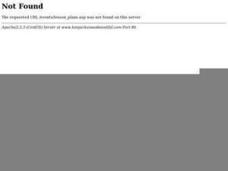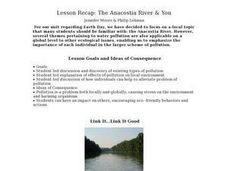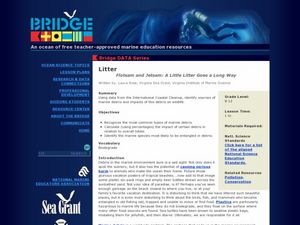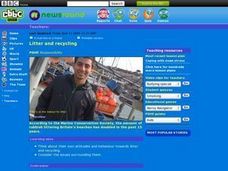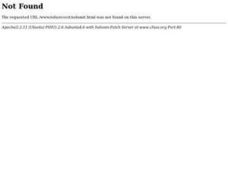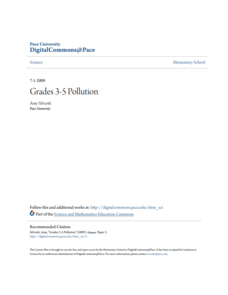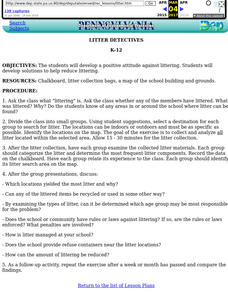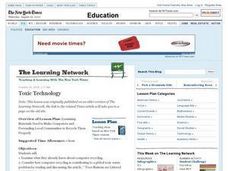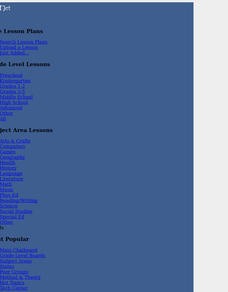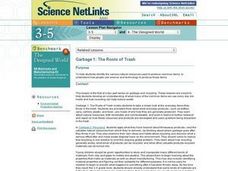Curated OER
"Litter Literature"
Students investigate the effects of littering. They read and discuss the story, 'The Wartville Wizard,' identify the characters and answer discussion questions, and role-play scenarios from the book.
Curated OER
Lesson Recap: The Anacostia River & You - Biology Teaching Thesis
Seventh graders give examples of local sources of pollution and postulate reasons as to why local sources of pollution can harm the ecosystem. They address the following question in short answer form: "Why is litter/chemical pollution...
Berkshire Museum
Reduce, Reuse, and Recycle: Sorting Through Personal Choices
Raise children's awareness about the importance of conservation with this hands-on science lesson plan. Start by breaking the class into groups and having them collect trash from around the school or local park. Students then use the...
Curated OER
Litter Bugs
Young scholars read the book The Warville Wizard about litter, identify litter around their homes and school, and come up with solutions to the litter problem. In this litter lesson plan, students discuss how to be proactive and not litter.
Curated OER
LitterFlotsam and Jetsam: A Little Litter Goes a Long Way
Students explore the concept of environmental stewardship. In this science lesson, students investigate data from the International Coastal Cleanup, identify sources of marine debris, and discover the impacts of this debris on wildlife.
Curated OER
Marine Debris on the Chesapeake Bay
Learners examine problem of litter and marine debris on the Chesapeake Bay, and experiment with density of marine debris.
Curated OER
Scientific Inquiry
Students create a poster. In this recycling lesson, students discuss pollution and the ways humans negatively affect the environment. Students describe examples of litter or pollution they have experienced. Students collect litter from...
Curated OER
Litter and recycling
Students read and discuss as a group the story, " Litter bugs Ignoring new laws." They discuss the story and then fill out a questionnaire and discuss ways of improvement and recycling ideas.
Curated OER
Naturalist Activity Workbook
In this Webelos naturalist instructional activity, learners list short answers to 13 questions and assignments. The instructional activity also includes a list of online resources.
Wilderness Classroom
Pollution
Educate scholars on pollution—air, water, and land—with a series of lessons that begin with a thorough explanation of each type. Learners then take part in three activities to reinforce the importance of reducing pollution. They...
Marine Institute
Water Pollution
Sixth graders investigate the various types of pollutants found in water and ways to help prevent water pollution. Through a hands-on experiment, students create samples of polluted water by mixing water with vegetable oil, dirt, and...
Curated OER
Where Does Al the Waste Go?
Students construct a sanitary mini-landfill and an open mini-dump. Over a thirty day period, they compare the two methods and determine landfills are envorinmentally safer. They observe a demonstration of burning waste. They create...
Curated OER
Help Bob Bat Find a Path
In this Bob Bat worksheet, young scholars will help Bob find a new home by linking "natural" words through a maze of man made words, such as umbrella and litter.
Beyond Benign
Medical Ethics
Just because we have the ability to determine an organism's traits through genetic testing, should we do it? Middle-school medical experts examine the ethical dilemmas in biotechnology in the 18th and final installment in a series of...
Curated OER
Rubber Duckies and Ocean Currents
Students explore marine life by conducting a rubber duck experiment. In this water currents lesson plan, students practice identifying latitude and longitude coordinates on a map and define the currents of major oceans. Students discuss...
Pace University
Pollution
Over the course of 10 days, scholars take a pre-assessment to place them in one of three leveled groups. Whole-class and in small groups, pupils take part in read-alouds, field trips, hands-on activities, and complete learning contracts...
Curated OER
Litter Detectives
Students develop a positive attitude against littering by creating solutions to help reduce littering.
Curated OER
It's a Wrap!
Students read about the importance of packaging foods and related items properly and reducing waste. In this packaging lesson, students read the background information about packaging and bring a variety of packaging materials to class....
Curated OER
The Waste Paper Basket
Students examine the consequences of littering and creating garbage.
Curated OER
TOXIC TECHNOLOGY
Students examine what they already know about computer recycling and cconsider how computer recycling is contributing to a global toxic waste problem by reading and discussing the article, ""Poor Nations are Littered With Old PC's,...
Curated OER
Waste Not, Want Not
Young scholars consider the types of debris that litters beaches and conduct research on waste management. They then interview professionals in a particular field of waste management and write reports for a booklet about garbage and...
Curated OER
Pollution
First graders identify and discuss different kinds and sources of of pollution. They explain why it is important to keep the environment free of pollution. They make a poster depicting the dangers of pollution and make litter boxes.
Curated OER
GARBAGE 1: THE ROOTS OF TRASH
Students identify the various natural resources used to produce common items; to explain how people use science and technology to produce those items.
Curated OER
Pollution Solution
Learners explore the concept of environmental stewardship. In this science lesson, students investigate the effects of oil spills and brainstorm ideas to help companies avoid them as they create models to demonstrate their attributes and...


